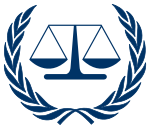International Criminal Court
|
International Criminal Court
Cour pénale internationale (French) |
|
|---|---|

Official logo
|
|

Parties and signatories of the Rome Statute
State party
Signatory that has not ratified
Signatory that subsequently withdrew its signature
Non-state party, non-signatory
|
|
| Seat | The Hague, Netherlands |
| Working languages | English French |
| Official languages |
6 languages
|
| Member states | 124 |
| Leaders | |
| Silvia Fernández de Gurmendi | |
| Fatou Bensouda | |
| Herman von Hebel | |
| Establishment | |
|
• Rome Statute adopted
|
17 July 1998 |
|
• Entered into force
|
1 July 2002 |
|
Website
www.icc-cpi.int |
|
| International Criminal Court | |
|---|---|
 |
|
| General information | |
| Status | Complete |
| Type | Office |
| Location | The Hague, Netherlands |
| Coordinates | 52°6′20″N 4°19′7.16″E / 52.10556°N 4.3186556°ECoordinates: 52°6′20″N 4°19′7.16″E / 52.10556°N 4.3186556°E |
| Construction started | Autumn 2012 |
| Opened | December 2015 |
| Technical details | |
| Floor area | 52,000 m2 (560,000 sq ft) |
| Design and construction | |
| Architect | schmidt hammer lassen |
| Developer | Combination Visser & Smit Bouw and Boele & van Eesteren ('Courtys') |
| Website | |
| http://www.icc-permanentpremises.org | |
The International Criminal Court (ICC or ICCt) is an intergovernmental organization and international tribunal that sits in The Hague in the Netherlands. The ICC has the jurisdiction to prosecute individuals for the international crimes of genocide, crimes against humanity, and war crimes. The ICC is intended to complement existing national judicial systems and it may therefore only exercise its jurisdiction when certain conditions are met, such as when national courts are unwilling or unable to prosecute criminals or when the United Nations Security Council or individual states refer investigations to the Court. The ICC began functioning on 1 July 2002, the date that the Rome Statute entered into force. The Rome Statute is a multilateral treaty which serves as the ICC's foundational and governing document. States which become party to the Rome Statute, for example by ratifying it, become member states of the ICC. Currently, there are 124 states which are party to the Rome Statute and therefore members of the ICC. However, Burundi, South Africa, and the Gambia have given formal notice that they will withdraw from the Rome Statute.
The ICC has four principal organs: the Presidency, the Judicial Divisions, the Office of the Prosecutor, and the Registry. The President is the most senior judge chosen by his or her peers in the Judicial Division, which hears cases before the Court. The Office of the Prosecutor is headed by the Prosecutor who investigates crimes and initiates proceedings before the Judicial Division. The Registry is headed by the Registrar and is charged with managing all the administrative functions of the ICC, including the headquarters, detention unit, and public defense office.
...
Wikipedia
